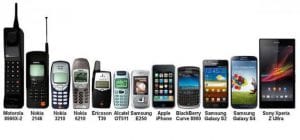Defining our Information Society can be viewed through five aspects Technological, Economical, Occupational, Spatial and Cultural. Each of these aspects impacts how we view the various areas of information around the world varying from the latest world news story to the status update that is being uploaded to your friend’s Facebook page.
We all have this varying opinion of how we view and use technology. Following this week’s module reading it got me thinking about the change in history for many devices that we use on a regular basis.
For example our television and phones have changed vastly in shape and size over the past two decades alone. This update encourages the viewer to become more tech-savy as the continual way that we view information changes with the use of a new app or device.
This may create an issue for the consumer as the updates keep occurring the prices rise which limits the amount of consumers that can access them. I still recall that moment of realising that my phone is out of date once the functions such as battery life or processing speed are heavily reduced. Therefore we continue to process this data through our phones nonetheless with the addition of the ever so helpful Internet.
When I thought about the occupational side of our society, the question: ‘Who determines if they are an information worker?’ Does this question need to be answered specifically or can it become an open ended answer that focuses on all sorts of professions? The professions that were mentioned this week include engineers, managers and research scientists; which certainly seems like we’re placing even more pressure on those individuals who are in control of other workers.
I thought the spatial aspect of the information society was quite interesting this week as it built upon my prior knowledge of social networking platforms that are used for personal or professional purposes. As apps like Facebook or Instagram continue to build that connection particularly with people overseas as well as promote more time that these programs can be accessed.
Lastly when I think of cultural aspects of information I think of other countries or places groups of people have lived in growing up. However it didn’t occur to me that the influence of culture particularly in fiction (the Harry Potter series was a good example this week) could be a way to broadcast a specific genre of text; whether this is through physical or digital form.
Each aspect certainly raised my awareness of the constant connections that we make every day throughout our own personal world.
No Comments